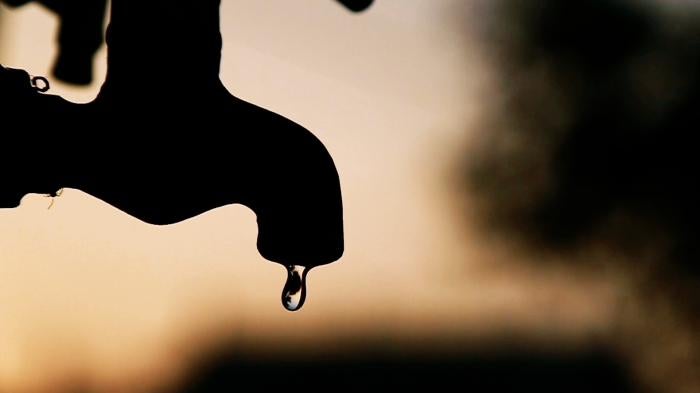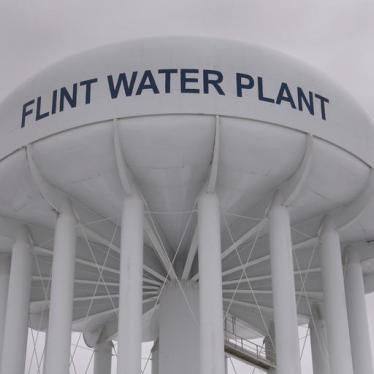(Washington, DC) – The United States Congress should support programs that ensure everyone in the US has access to safe and affordable water, Human Rights Watch said in a video released today. To advance this crucial goal, the US government should recognize that access to clean water is a fundamental human right.
The Human Rights Watch video, which features Water Equity and Climate Resilience Caucus members Susana De Anda of the Community Water Center, Monica Lewis-Patrick of We the People Detroit, and Janene Yazzie of Sixth World Solutions, says that Congress should take steps toward guaranteeing universal access to safe drinking water and sanitation. Congress should ensure that the infrastructure bill and budget reconciliation currently under negotiation include sufficient funding for an equity-focused water assistance program.
“Many people in the US take for granted that they can turn on the tap and have clean water, but it’s a human right that is out of reach for millions of American households,” said Amanda Klasing, associate women’s rights director and water and sanitation rights specialist at Human Rights Watch. “With aging infrastructure, climate change, and a global pandemic, Congress should make certain that the most seriously affected households and communities have the resources they urgently need.”
A lack of federal investment and focus on equity and nondiscrimination have exacerbated unequal and unsafe water conditions for many American households, disproportionately affecting people who are low-income, Black, Indigenous and people of color. Further, a pervasive lack of access to information makes it difficult for communities to monitor violations of the rights to water and sanitation or to successfully advocate with local, state, or federal governments for local, rights-based solutions.
Despite a growing and predictable water affordability crisis in the US, the federal government has been unwilling to recognize an obligation under international human rights law to ensure safe drinking water and sanitation. In 2019, a US representative at the United Nations when considering a resolution on the right to water said, “We disagree with any assertion that the right to safe drinking water and sanitation is inextricably related to or otherwise essential to enjoyment of other human rights, such as the right to life.” International human rights bodies, at the urging of local activists, have raised concerns for years that the US is failing in its obligations to ensure the rights to water and sanitation.
There are no federal mandates or federal government data regarding water affordability. However, water affordability is fundamental to the realization of the human right to water, which entitles everyone, without discrimination, to have access to sufficient, safe, acceptable, physically accessible, and affordable water for personal and domestic use.
The Covid-19 pandemic has underscored the urgent need for rights-based water and wastewater investments that focus on communities that for years have lacked access to sufficient, safe, and affordable water, Human Rights Watch said. With further reductions of water quantity and quality as a result of climate change, water and wastewater services are increasingly too expensive for many households and communities throughout the US.
Since the start of the Covid-19 pandemic in March 2020, health and human rights advocates have increasingly called for the US government to recognize the human right to water and end the local government and utilities practice of shutting off water services to households unable to pay. Congress in two of its Covid-19-related relief packages allocated over $1 billion to establish and fund the Low Income Household Water Assistance Program (LIHWAP) to provide assistance to low-income households with water and wastewater bills. This is not a permanent program, and the program has met with criticism for having discriminatory criteria for participation.
Various resolutions from the UN General Assembly and Human Rights Council affirm that the right to safe drinking water is derived from the right to an adequate standard of living. The UN Committee on Economic, Social and Cultural Rights in its general comment on the right to water noted that a core aspect of the right to water is that water required for personal or domestic use must be safe. The committee also stated that violations of the obligation to fulfill the right to water can occur when there is “insufficient expenditure or misallocation of public resources which results in the non-enjoyment of the right to health by individuals or groups.”
Congress should take the current budget and infrastructure bill negotiations as an opportunity to advance key provisions of a human right to water, including funding a permanent program that goes beyond emergency assistance with water bills and works towards ensuring long-term water affordability for all, especially the most affected communities, Human Rights Watch said. It should also provide for reporting on the full scale of the water affordability crisis, including data about water shut-offs around the country for inability to pay and the racially discriminatory impact of the crisis.
“In negotiating trillions of dollars of infrastructure investments, Congress should at a minimum make meaningful investments in water affordability programs that uplift and empower the most affected communities to move towards universal access to water,” Klasing said. “Anything less is just another human rights failure with a big price tag.”









